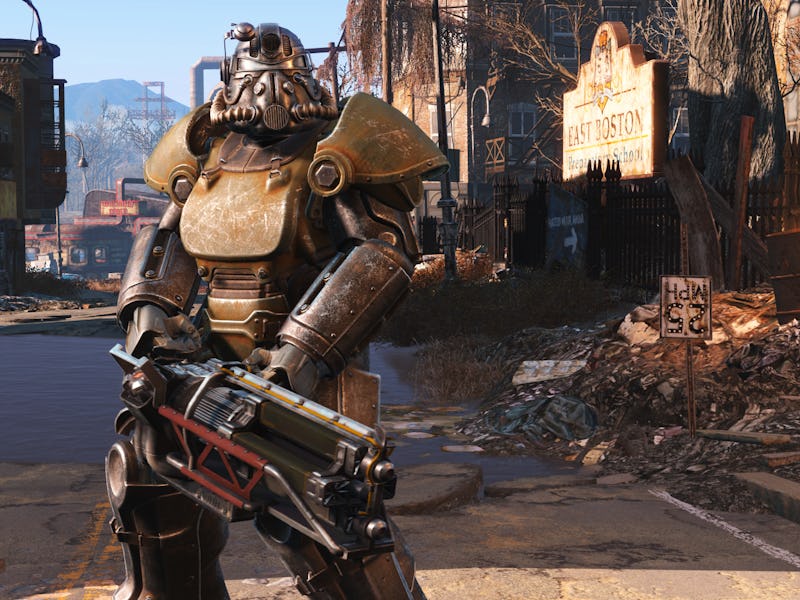If You Liked 'Fallout 3', You'll Probably Love 'Fallout 4'
'Fallout 4' takes the best of the previous game in the series and improves the worst

Fallout 4’s impeding November 10th release feels slightly unreal, even uncertain. Not just based on timing and excitement, but also that Bethesda’s other games like Fallout 3 and Skyrim rarely feel complete in their initial form. Massive open-world games like these are usually buggy, so it’s worth waiting for the patch. Expansion packs fill out missing parts of the world, and fix busted systems.
But that’s the case with Fallout 4. To put it simply: if you liked Fallout 3, you’ll probably love Fallout 4.
This isn’t a full review — it’s a huge game and we’re taking our time with it. But for the first time in a decade, a Bethesda game feels like it’s building on the foundation its predecessors left behind. The great parts of Fallout 3 — picking a direction, wandering to a landmark, finding a story, and diving in — remain in the fourth installment of the series. But Bethesda has also worked to fix the most glaring weaknesses of their past games. Here are the three best improvements.
‘Fallout 4’ is stable and gorgeous
Fallout 4 hasn’t crashed once for me, over 15 hours in. I’m playing on PC, so that’s an extra special achievement. What’s more, it’s never felt like it’s about to. There are no significant slowdowns, no major graphical glitches, and the worst technical thing that’s happened is a minor shopkeeper I tried to buy from not having anything to offer. Even better, for a huge, open-world game, there are minimal load times. Getting into the game is a matter of seconds, as is fast travel or loading games within the engine. When playing Fallout 4, almost nothing blocks me from actually playing.
In short, Fallout 4 is polished as hell, and gives lie to the fear that I had that it wasn’t going to be worth playing for month or even years after release, as happened with Fallout 3 and New Vegas. This isn’t just technical; it’s also stylistic. Fallout 4 is gorgeous, and even includes things like weather effects, which provided some of the best mods for previous games. The first moment when raindrops fall on the visor of your power armor, well, it’s special.
‘Fallout 4’ is a better role-playing game
Bethesda is great at creating worlds, but it’s less successful at creating good RPG systems for wandering through them. Fallout 3 tried to adapt the original Fallout games’ SPECIAL system to a first-person view, and was only partially successful — it wasn’t bad, but it was never a reason to play the game. Skyrim’s RPG systems, meanwhile, were some of the weakest parts of that otherwise-great game, with players granted inconsistent and largely irrelevant rewards. Fallout 4, on the other hand, has a system that fits within its game.
Essentially, Bethesda tries role-playing games where you build your character in relation to how you understand the world. In Fallout 4 that model succeeds by, essentially, starting with a weaker character and getting upgrade options each level. These choices are consistently a mix of working toward something long-term, or getting short-term help. For example, I quickly found my character had far too low of a Charisma for what I wanted to do, so I built that up when I could, but quickly found there was always a new level of Hacking to build, or an improvement to my life. Fallout 4 fills itself with interesting choices at each level, in a way that matches the rest of the game. But it’s not the only system that works better in Fallout 4.
The crafting system ties the rest of ‘Fallout 4’ together
I dreaded the crafting in Fallout 4 when it was announced. Poor crafting systems have damaged far too many RPGs in my experience, most notably, Bethesda’s last game, Skyrim. In those games, the issue is simple: Crafting is largely disconnected from the main game, offering primarily a method for getting certain items. The systems were filled with loose ends, rarely reinforcing any other aspect of the main game.
In Fallout 4, the crafting system ties into almost everything. Every item you can pick up in the game can be broken down into parts, and those parts are probably useful for something. Modifying weapons requires parts, while so does building up your settlements in the base-building aspect of the game. Hell, there’s even a Junk Gun that shoots random stuff you pick up. You can ignore any aspect of crafting (there are plenty of good items to be picked up or purchased while exploring), but engaging at all leads to item pickup as an interesting portion of the game. This all feeds back into the character progression, as modifying your armor or building your town both require certain character upgrades.
Essentially, Bethesda has fixed their games’ greatest weaknesses — instability and incoherent systems — and combined those improvements with what already works. This isn’t to say that Fallout 4 is an instant classic, as I still have much of the story to go and plenty of time to break the game. But while there is room for Fallout 4 to disappoint me in the future, it hasn’t done so yet.